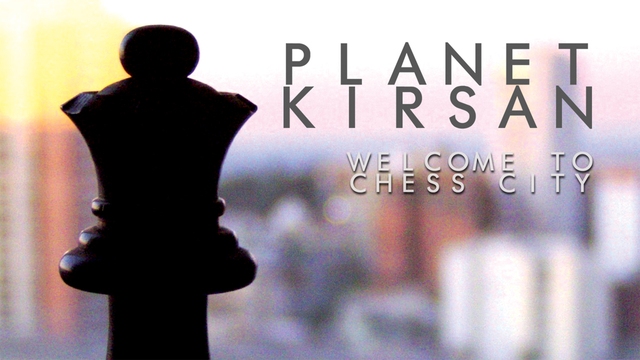Amir's face is taut with tension. His eyes focus in on the board as he plots his next move. Years of harsh tutelage have prepared him for this. Kalmykia is a nation obsessed with chess and this is the most important few minutes in most children's lives, the final act of a chess match. We follow Amir and his brother Aleshan through their struggle to become champions, and the access to a better life it brings. The hand hovers over the chess piece, the tension in the room could be cut with a knife, the move happens and then the riposte. Check mate, a dream comes true.
"Tasks like this week's will finish you off: damn!" Amir's chess instructor bellows at him. The young boy keeps his head down, eyes locked on the board. This is the daily routine for these boys in the chess capital of the world,
"We get back from school and do the chess homework, then we learn chess, eat, do our homework and go to bed", Amir tells us. And yet the hours of practice and the cruel words of their tutor do not to phase them. The dream of becoming chess world champions is enough to sustain them through it all.
But for the boys chess brings not only hope for the future, enthusiasm for the game is also deeply engrained.
"I pinned his pieces", Amir says, his face flush with enthusiasm,
"I was thinking three or four moves ahead and then bang! I saw I could pin his pieces", he continues breathless with excitement.
Kalmykia's chess obsession is the vision of their first president, Kirsan Ilyumzhinov, also a former chess world champion. He puts his own personal success down to chess and sees Kalmykia's hopes for the future tied to that game. He feels chess will give the next generation something extra,
"the ability of self-assessment and self-analysis, this whole chess philosophy should pervade the citizens of Kalmykia". And so, young, smart and extremely determined the children of Kalmykia spend their days preparing for the annual chess tournament.
In the meantime however life is not easy on the steppe of Komsomolski. The flat and barren landscape merely reinforces the poverty of this region. In this stark environment an all or nothing attitude has been bred,
"Only winning counts, I don't congratulate 2nd or 3rd", says the boys' tutor. Life is hard and chess is no different.
"You have to learn to anticipate your opponent's moves", is the mantra they must all learn and there is no mercy for a child who is slow to pick it up.
However, Kirsan sees chess's role as more important than merely improving the children's education. It's almost a religion, that will provide guidance as well as shape strong minds.
"DNA consists of 64 units, a chessboard has 64 squares - it is not a coincidence. I realized chess came to us from outer space, it's a special code given to us so we can work out our lives". His faith is unwavering and the people of Kalmykia have followed him, now their future is riding on 'The sport of Kings'.
Produced by Eureka Media
LEARN MORE.
WATCH MORE.
JOIN THE DISCUSSION.
 Amir's face is taut with tension. His eyes focus in on the board as he plots his next move. Years of harsh tutelage have prepared him for this. Kalmykia is a nation obsessed with chess and this is the most important few minutes in most children's lives, the final act of a chess match. We follow Amir and his brother Aleshan through their struggle to become champions, and the access to a better life it brings. The hand hovers over the chess piece, the tension in the room could be cut with a knife, the move happens and then the riposte. Check mate, a dream comes true.
Amir's face is taut with tension. His eyes focus in on the board as he plots his next move. Years of harsh tutelage have prepared him for this. Kalmykia is a nation obsessed with chess and this is the most important few minutes in most children's lives, the final act of a chess match. We follow Amir and his brother Aleshan through their struggle to become champions, and the access to a better life it brings. The hand hovers over the chess piece, the tension in the room could be cut with a knife, the move happens and then the riposte. Check mate, a dream comes true.



